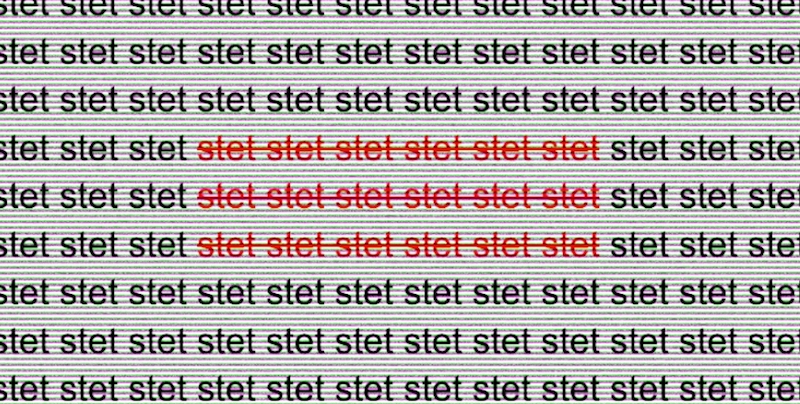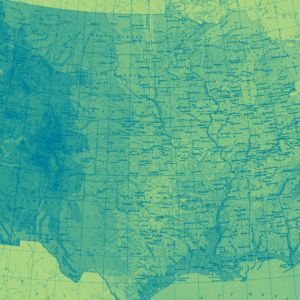
Against Copyediting: Is It Time to Abolish the Other Department of Corrections?
Helen Betya Rubinstein on Having Power Over More Than Just Commas
I copyedited for five years in the offices of an esteemed book publisher, and during that time I became an expert in the most trivial things. Minor details occupied my workdays, which I spent in a dusty, windowless room, in an office where tall file cabinets topped by unruly stacks of manuscripts still lined the halls. There, I sometimes chewed a raisin-walnut roll from the Union Square farmer’s market while I worked, or got up to refill the paper cup of water I sipped from all day just to give myself a break.
The adverb hyphenated mid-syllable on page 15 needed tending, as did the orphan—that is, the lonely last line of a paragraph—marooned at the top of page 38. A sentence on 179 began with the sort of dangler that could be made acceptable by changing “Like” to a stodgy “As with,” and the designer kept printing the jacket with prime signs instead of apostrophes, or commas outside quotation marks, or two spaces before a period where we’d already marked one to be cut, and so we sent the proofs back to be printed again.
The former closet where I sat my first year had no computer, just two heavy dictionaries, a thesaurus, and an atlas, and I didn’t yet have text messaging on my phone—once, I discovered an out-of-town friend simply waiting for me outside—but the monasticism suited the work, which felt strangely hallowed. If stultifying, inexhaustible pettiness is the trade of copy editors, then so too is an air of gravitas, or piety, or prestige—something that smells like aging books and tastes like power.
An editor could make whatever suggestions they wished, and the writer, of course, could compose their book-in-progress with as much vision and dream as they pleased. But our deletions and additions—marked in colored pencil on rubber-banded pages, next to which I kept a soft gray eraser—these carried a finality the previous decisions lacked. We could insist a character was not racked with guilt but wracked with it, that an event didn’t happen all of the sudden but all of a sudden, or that the narrator hadn’t kept her eyes pealed but peeled. We determined whether someone was your sister Jane or your sister, Jane, and when a comma needed to precede “who.” We were the arbitrators of these details and the litigators of every request to bend or amend the rules. We were the keepers of the status quo.
I was just a few months out of college when I landed that position, at a rate of $14 and eventually $22 an hour, but the writers and editors I was ostensibly servicing were surprisingly deferential to my pencil marks. There was an editor on the floor who had been at the publisher almost fifty years, and who sometimes tapped on my door to ask how to mark a line break, or whether a pattern in a writer’s language made “grammatical” sense. Her deference unsettled me so much that each time she knocked I told myself she just felt sorry for the lonely drudgery I tallied by the hour.
All of us were gatekeepers in some sense—the editor most obviously gatekeeping what would be published and how, the writer less obviously gatekeeping which details and experiences would qualify as “story,” and how they would be shaped, told, and reproduced. But I gatekept a set of social mores for which I could call in a seemingly unanimous chorus, marking “Web. 8th” to indicate the source of a preferred spelling, or “CMS” for a Chicago Manual rule. I was a litigator, upholding (and occasionally granting exceptions to) a codified set of rules. But whose were the laws?
The linguistics classes I’d taken in college had taught me to appreciate that languages weren’t stable systems but ever-changing, and that these changes build community, exemplify the power of creativity and play, and repair harm. In the best-case scenario, my work might involve legitimating such signs and forms of life: I might put newly coined words and syntactic variations on one book’s style sheet, setting up a precedent for the next.
Copyediting shares with poetry a romantic attention to detail, to the punctuation mark and the ordering of words.
In my early twenties, though, I felt like the wrong person to wield a legitimator’s power. And in practice, I was less the advocate of adventurous commas or paradigm-shifting syntax than a weary cleaner of the tiniest, most sparkling closet, working through the nooks and crannies of written English with my lead-pencil broom. I was more respected, and almost certainly better paid, than the actual people who sometimes dipped into our offices, dragging a fragrant dolly of supplies, to take out the pencil shavings and napkins I’d tossed in the trash.
But by the end of my five years at the publisher, I felt intellectually and psychologically worn down by the labor I logged on my biweekly timesheets. Whatever roller-rink of neurons helped me spot aberrations from convention had grown practiced and strong, and it was difficult to read any unconventional sentence without reflexively rearranging it into a more conventional form.
Something had shrunken and withered in me, for having directed so much of my attention away from the substance of the stories I read and into their surface. Few people in our office, let alone outside its walls, would notice the variation in line spacing, the fact that Jesus’ was lacking its last, hard “s,” or whatever other reason we were sending the proofs to be printed again—and if they did, who the fuck cared?
The publisher where I worked was supposedly one of the best places to train for this job: of the major trade publishers, they considered themselves the most old-school, vigilant about fact-checking, last to convert to digital work. They’d trained copy editors who’d left to earn more money elsewhere, and retained a pride in their own non-commercialism that I experienced then as a form of condescension toward the masses (during the period I was there, there was much handwringing over the prospect and then the fact of their 2008 buyout by one of publishing’s “Big Five”).
The copy editors who’d left, I was meant to imagine, might have earned more money, but could not have copyedited with the same care we lavished on our manuscripts, given the breakneck pace of producing those big publishers’ books. Our mode of copyediting might have been waning as a norm, but it remained—and remains—an accepted ideal.
It’s absurd to insist that any choice about language be apolitical.
I can’t help wondering, though, whether there wasn’t something insidious in the way we worked—some poison in our many rounds of minute changes, in our strained and often tense conversations about ligatures and line breaks, in our exertions of supposedly benign, even benevolent, power; if those polite conversations constituted a covert, foot-dragging protest against change, an insistence on the quiet conservatism of the liberal old guard, and if they were a distraction from the conversations that might have brought meaningful literary or linguistic change about. In fact, I sense myself enacting the same foot-dragging here.
It’s fun—it’s dangerously pleasing—to linger in the minutiae of my bygone copyediting days, even if, by the time I left that job to teach college writing full-time, I was convinced that “correcting” “errors” of convention most readers would never notice was the least meaningful work a person could possibly do. I’m writing this, however, to ask whether copyediting as it’s been practiced is worse than meaningless: if, in fact, it does harm.
*
Do we really need copyediting? I don’t mean the basic clean-up that reverses typos, reinstates skipped words, and otherwise ensures that spelling and punctuation marks are as an author intends. Such copyediting makes an unintentionally “messy” manuscript easier to read, sure.
But the argument that texts ought to read “easily” slips too readily into justification for insisting a text working outside dominant Englishes better reflect the English of a dominant-culture reader—the kind of reader who might mirror the majority of those at the helm of the publishing industry, but not the kind of reader who reflects a potential readership (or writership) at large.
A few years before leaving copyediting, I began teaching a scholarly article I still read with students today, Lee A. Tonouchi’s “Da State of Pidgin Address.” Written in Hawai’ian Creole English, or Pidgin, it asks whether what “dey say” is true: “dat da perception is dat da standard english talker is going automatically be perceive fo’ be mo’ intelligent than da Pidgin talker regardless wot dey talking, jus from HOW dey talking.” The article leaves many students questioning the assumptions they began reading it with: its effect is immediate, personal, and profound.
In another article I pair it with, “Should Writers Use They Own English,” Vershawn Ashanti Young answers Tonouchi’s implicit question, writing, “don’t nobody’s language, dialect, or style make them ‘vulnerable to prejudice.’ It’s ATTITUDES.” Racial difference and linguistic difference, Young reminds us, are intertwined, and “Black English dont make it own-self oppressed.”
It’s clear that copyediting as it’s typically practiced is a white supremacist project, that is, not only for the particular linguistic forms it favors and upholds, which belong to the cultures of whiteness and power, but for how it excludes or erases the voices and styles of those who don’t or won’t perform this culture. Beginning with an elementary school teacher’s red pen, and continuing with agents, publishers, and university faculty who on principle turn away work that arrives on their desk in unconventionally grammatical or imperfectly punctuated form, voices that don’t mimic dominance are muffled when they get to the page and also before they get there—as schools, publishers, and their henchmen entrench the idea that those writing outside convention are not writing “well,” and therefore ought not set their voices to paper at all.
I wonder if, in renouncing my job when I left it—in calling copyediting the world’s least meaningful work—I might have been reenacting some of the literary scene’s most entrenched big-dick values.
Copyediting is also a white supremacist project in its enactment of the values of domination as detailed by Tema Okun in the well-circulated “White Supremacy Culture” document—perfectionism, for one, and worship of the written word, but also the kind of systemic disregard for humanness that pervades Okun’s list: an attachment to logistics and rules instead.
I’d observed when we “translated” books from British or Australian English that books in other countries tended to be less meticulously cleaned up than ours, and as a result I associate the American practice of copyediting with Protestant discipline and a kind of Puritan ethics, an especially American squeamishness about the corpus.
Respect for the trivialities of English convention (and the “capacity” to command them) begins for many of us in kindergarten or first grade, when our self-conceptions as “good” or “bad” writers depend on the skills we are then being taught: how to form letters by hand, how to spell, to capitalize, to denote the difference between a noun and a verb. These skills have very little to do with the qualities that are actually, literally valued—in the form of dollar-dollar bills—by publishers of magazines or books, let alone by those distributing resources in more lucrative fields like film or TV.
But their valuation as a form of prestige capital is deeply ingrained, so much so and so unquestioningly that it remains socially acceptable to call oneself a “grammar snob,” even a “grammar Nazi.” The status afforded these trivia is indicative of what they represent: either belonging to the culture of the powerful or compliance with it, as determined by its appointed disciplinarians.
Reading applications to an undergraduate creative writing track some years ago, I was struck by the number of applicants who cited an elementary school teacher as the origin of their desire to write—who, in other words, credit a first-grade teacher’s praise as the source of their intent to pursue writing as a vocation or career. Should this be where the thousands of hours endemic to a writing life arise?
On the other side of the same coin, I’ve met countless imaginative thinkers and storytellers who, because they aren’t natural spellers or don’t have tidy handwriting or were constitutionally resistant to the doldrums of the five-paragraph essay form—arguably a sign of so-called “talent” in itself—had not only never identified as writers, but had been led to believe that their writing was not “good.”
Copy editors often wield what power they do have unpredictably, teetering between generous attention and brute, insistent force.
Some of this speaks to the deep-seatedness of power dynamics internalized at a young age. Some of it speaks to our attachment to clear answers, to an elementary-school paradigm of right-and-wrong. I see, for both students and the writers I work with as a coach, how much safer and easier many people find it to talk about the “rules” of sentences than about less codified, more mysterious aspects of writing, like structure or mood.
I see, too, how often a peer editor seems to get a charge from “gotcha”-ing someone else on these rules. There are power dynamics involved, and for the one doing the “gotcha”-ing, there is often a kind of grasping at straws—a clinging to the “known” and the “knowable,” so as to avoid the terror of the unknown, including the unknown of not knowing whether or how to value oneself.
All of this brings to mind the purposes of modern schooling that Alexander Inglis articulated in 1918, and which John Taylor Gatto invokes in his 2003 essay “Against School”: to establish reflexive obedience before authority, encourage conformity, bar those tagged “unfit” from social advancement, and reproduce this very system—functions we might read in the practice of traditional copyediting as well. Gatto, a libertarian, was writing against the oppression of what he calls the “underclasses,” but it’s easy to see how the racist school-to-prison pipeline arises and thrives within the paradigm he describes.
The school-to-publishing pipeline might work in a similar vein, our most revered copy editors those selfsame red-pen-wielding schoolmarms of yore. The connection between these two “corrective services” is less farfetched than it might seem: the front cover of Lynne Truss’s 2011 bestseller Eats, Shoots & Leaves baldly announces its “Zero Tolerance Approach to Punctuation” and, even as it labels those identifying with its perspective “pedants” and “sticklers,” delights in its own punitive thrills. Faced with a misplaced apostrophe on a public banner, Truss writes that her “anger gives way to a righteous urge to perpetrate an act of criminal damage.” Such is the celebrated and richly rewarded spirit of the grammar police. Lighthearted though it may be, it’s hard not to hear echoes of the far right when Truss whimpers, “It’s tough being a stickler for grammar these days.”
I suspect books like this one, or memoirs by former copy editors like The New Yorker’s Mary Norris—who goes by the Comma Queen—are popular for the same reasons books and movies about the wealthy have long been popular: because of a desire to peep the lives of the powerful (your highness the royal arbiter of the comma!), and, perhaps, to absorb or perform some of that power by learning and thus assimilating its values. The publisher where I worked had been founded by a relative of the Guggenheim family and a member of Yale’s Skull and Bones secret society, a story I wager is typical of many well-resourced publishers, so much of the world’s art offered visibility, distribution, and prestige care of the benevolent elite’s disposable wealth.
At the same time, copy editors, like schoolteachers, rarely represent the elite themselves. Usually women, they are also usually poorly paid. An elderly British woman who sometimes advised me had worked at the publisher since immigrating to the US thirty years before, and copyedited Jonathan Franzen’s first books. But her shelves were double-stacked with uncracked hardcovers and yellowing copies of whatever daily newspaper they handed out at subway stations for free; the detritus of her lunches—egg and bacon on a roll, dollar pizza slices—lingered in the corners of her desk.
Copy editors, like schoolteachers, rarely represent the elite themselves. Usually women, they are also usually poorly paid.
Sometimes she grew so incensed by an author’s willful or accidental noncompliance that she would shut her office door to huff, moan, and scream in frustrated rage. Interviewed in a 1990 article in The New York Times, she claimed that aspiring copy editors no longer even knew what adjectives were. I approached her the same way I might a labile family member: you never knew when she was going to go off.
Like other emissaries of the powerful (see, e.g., the actual police), copy editors often wield what power they do have unpredictably, teetering between generous attention and brute, insistent force. You saw this in the way our tiny department got worked up over the stubbornness of an editor or author who had dug in their heels: their resistance was a threat, sometimes to our suspiciously moral-feeling attachment to “correctness,” sometimes to our aesthetics, and sometimes to our sense of ourselves.
I do remember trying to convince the publisher not to invoke an Islamophobic stereotype on the cover of a young adult novel as a means of advertising that the book, which featured a Muslim family, disproved it (after a long back and forth, the author and editor agreed). But the substance of every other battle I fought—and there were many, most of which were comma-level minor and a few of which kept me up at night—is lost. To my chagrin, I remember only my own indignation: proof, perhaps, that the attachments we bring to the enterprise of “correcting” written work are, almost always, about something else.
*
There’s a flip side, if it’s not already obvious, to the peculiar “respect” I received in that dusty closet office at twenty-two. A 2020 article in the Columbia Journalism Review refers casually to “fusspot grammarians and addled copy editors”; I’m not the only one who imagines the classic copy editor as uncreative, neurotic, and cold.
I want to say they’re the publishing professionals most likely, in the cultural imagination, to be female, but that doesn’t feel quite right: agents and full-on editors are female in busty, sexy ways, while copy editors are brittle, unsexed. Their labor nevertheless shares with other typically female labors a concern with the small and the surface, those aspects of experience many of us are conditioned to dismiss.
I’m willing to bet, too, that self-professed “grammar snobs” rarely come from power themselves—that there is a note of aspirational literariness in claiming the identity as such. Once, a celebrated male writer who was my instructor at an MFA program found out I’d worked as a copy editor, and responded enthusiastically, “Oh! You can tell me the difference between ‘that’ and ‘which.’”
Indeed I could, and, in an hourlong meeting we’d scheduled to discuss a draft of mine, I spent fifteen minutes doing so. I think I hoped to earn his friendship in exchange, or at minimum his respect. But as a young woman interacting with an older man who represented the kind of writer I hoped to become, I felt minimized inside the dynamic and, when he played the fool and asked me to explain again, I sensed condescension, even mockery, in the request.
It makes me wonder if, in renouncing my job when I left it—in calling copyediting the world’s least meaningful work—I might have been reenacting some of the literary scene’s most entrenched big-dick values: its insistence on story over surface (what John Gardner called the “fictional dream”), on anti-intellectualism but also the elitist cloak of it-can-never-be-taught. The grammar snob’s aspiration and my professor’s condescension bring to mind the same truism: that real power never needs to follow its own rules.
During the uprisings of the summer of 2020, when major news outlets like The New York Times began to capitalize “Black,” it could seem, from one angle, an eyerollingly trifling concession. “Let’s concentrate on correcting the many injustices committed against oppressed groups in our society and stop fiddling with language,” wrote one (male, Italian-American) journalism professor in a letter to the editor; “I am firmly convinced that changes in language arising from political motives are de facto suspect.” John McWhorter, the author of Woke Racism, later wrote in The New York Times that he lowercases the word in his copy, leaving it for editors to uppercase, because “in the grand scheme of things . . . I have a hard time caring that much whether we write ‘black’ or ‘Black.’” That he devoted a full essay to the topic, and insists on outsourcing this bit of labor, may or may not belie his claim.
I sense a kind of hysteria in these protests against “fiddling with language,” the same hysteria that led me to reject the work of copy editors with stridence. Yes, such changes are unbearably minor in the face of ongoing incarceration and murder; yes, they can resemble the peacocking of those corporate BLM statements that did little more than advertise corporations’ whiteness. But it’s absurd to insist that any choice about language be apolitical; writers like Tonouchi and Young make that clear, demonstrating how wrong it would be to entirely ignore a text’s surface: as wrong as it is to ignore race or any other cultural context.
Copyediting shares with poetry a romantic attention to detail, to the punctuation mark and the ordering of words. To treat someone else’s language with that fine a degree of attention can be an act of love. Could there be another way to practice copyediting—less attached to precedent, less perseverating, and more eagerly transgressive; a practice that, to distinguish itself from the quietly violent tradition from which it arises, might not be called “copyediting” at all; a practice that would not only “permit” but amplify the potential for linguistic invention and preservation in any written work?
This form of copyediting would involve less manicuring, less discipline, less standardization, zero punitive impulse, and more attention to managing the tiny story that each sentence is. We might even call it a kind of poetry, attentive to form and pattern in poetry’s spirit. Copy editor as poet-shepherd: the poet-shepherd of prose, maybe.
Helen Betya Rubinstein
Helen Betya Rubinstein's book Feels Like Trouble: Transgressive Takes on Teaching, Writing, and Publishing is forthcoming from the University of New Orleans Press. Other essays and fiction appear in The Kenyon Review, Gulf Coast, and Jewish Currents, where she is a contributing writer. She currently teaches at The New School, and works one-on-one with other writers as a coach.












